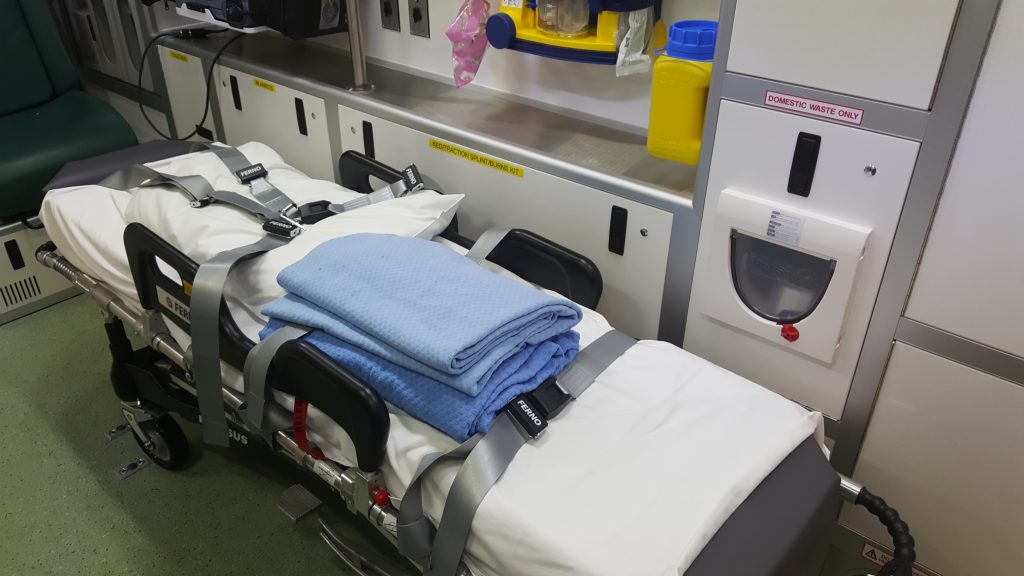 When medical emergencies strike, the rapid response of emergency medical technicians (EMTs) can mean the difference between life and death. However, the high-pressure nature of their role can also give rise to complex legal questions when outcomes take a tragic turn. Richard Miller’s case sheds light on the intricate landscape of EMT liability, illuminating the balance between legal protections afforded to these healthcare professionals and the pursuit of justice for patients and their families. It also helps answer the question: Can an emergency medical technician or their employer be held liable when things go wrong?
When medical emergencies strike, the rapid response of emergency medical technicians (EMTs) can mean the difference between life and death. However, the high-pressure nature of their role can also give rise to complex legal questions when outcomes take a tragic turn. Richard Miller’s case sheds light on the intricate landscape of EMT liability, illuminating the balance between legal protections afforded to these healthcare professionals and the pursuit of justice for patients and their families. It also helps answer the question: Can an emergency medical technician or their employer be held liable when things go wrong?
Richard Miller was injured in a motorcycle crash. Following the crash, emergency medical technicians employed by Northshore Emergency Medical Service transported Miller to Riverside Medical Center, where he was found to be in critical condition. Northshore transported him there before contacting Louisiana Emergency Response Network, a clearinghouse used to determine which medical center can best provide for a patient. Because Riverside did not have the proper resources to treat Miller’s severe injuries, the emergency room doctor had to contact the Louisiana Emergency Response Network to determine where to transport him. While in transit to the new hospital, Miller’s condition worsened. Unfortunately, he passed away when he arrived at the new hospital.
Miller’s estate and family filed a medical malpractice lawsuit against numerous companies and individuals, including Northshore, the company that transported him to Riverside initially. Northshore filed a summary judgment motion claiming Northshore was not liable to Miller for his injuries. The evidence it provided included an affidavit from the Northshore paramedic, medical records, and deposition testimony. The trial court granted Northshore’s summary judgment motion and dismissed Miller’s case. Miller appealed.
 Louisiana Personal Injury Lawyer Blog
Louisiana Personal Injury Lawyer Blog


 Suffering through an accident is bad enough, but dealing with the aftermath of that accident can be even worse without the help of a great attorney. An often overlooked but critical step in dealing with the consequences of an accident is deciding who to include or exclude from a release, which is a contractual agreement in which one party agrees to give up their right to bring a claim against another party. As Trena and Thomas Garrison learned after their accident in Baton Rouge, a small oversight on a seemingly standard release could result in a substantial loss of potential recovery.
Suffering through an accident is bad enough, but dealing with the aftermath of that accident can be even worse without the help of a great attorney. An often overlooked but critical step in dealing with the consequences of an accident is deciding who to include or exclude from a release, which is a contractual agreement in which one party agrees to give up their right to bring a claim against another party. As Trena and Thomas Garrison learned after their accident in Baton Rouge, a small oversight on a seemingly standard release could result in a substantial loss of potential recovery.  Automobile accidents are unavoidable tragedies that happen on our roadways daily. All drivers owe a duty to other drivers to keep each other safe, but how far does that duty extend and to whom does it extend to? That was the case when a Parish of Lafayette man was struck by a distracted driver while taking part in a promotional motorcycle ride sponsored by a local Harley Davidson dealership.
Automobile accidents are unavoidable tragedies that happen on our roadways daily. All drivers owe a duty to other drivers to keep each other safe, but how far does that duty extend and to whom does it extend to? That was the case when a Parish of Lafayette man was struck by a distracted driver while taking part in a promotional motorcycle ride sponsored by a local Harley Davidson dealership.  Generally, claimants interested in bringing any cause of action are required to stick to certain procedures including filing the claim within a specified time period. Medical malpractice claims are no different. Failure to file a claim within the statutorily imposed time frame will likely result in the dismissal of that claim. Without even considering liability, a court will be forced to terminate a lawsuit merely because it was filed too late. This, unfortunately, was the case for Linda Snavely in a recent case out of Lafayette.
Generally, claimants interested in bringing any cause of action are required to stick to certain procedures including filing the claim within a specified time period. Medical malpractice claims are no different. Failure to file a claim within the statutorily imposed time frame will likely result in the dismissal of that claim. Without even considering liability, a court will be forced to terminate a lawsuit merely because it was filed too late. This, unfortunately, was the case for Linda Snavely in a recent case out of Lafayette.  In Louisiana, the law benefits those who take timely action in pursuit of their claims or defense. It can also punish the untimely. In a very unfortunate case, the Plaintiff, a grieving widow, missed an opportunity to overturn an adverse trial court decision. In the case, the Fourth Circuit Court of Appeal discusses the procedural avenues of supervisory review available to litigants, highlighting the need to be diligent in meeting procedural requirements.
In Louisiana, the law benefits those who take timely action in pursuit of their claims or defense. It can also punish the untimely. In a very unfortunate case, the Plaintiff, a grieving widow, missed an opportunity to overturn an adverse trial court decision. In the case, the Fourth Circuit Court of Appeal discusses the procedural avenues of supervisory review available to litigants, highlighting the need to be diligent in meeting procedural requirements. People get car insurance to protect themselves in the event of a car accident. It is thus important that one takes care to research and consider what insurance plan is best for one’s needs. Liability insurance is designed to protect a person who owns or drives a vehicle from the costs of a lawsuit that might happen if that vehicle is in an accident. Insurance contracts define the scope of what sort of vehicles or potential plaintiffs will be considered covered under the policy. Generally, courts prefer to preserve the “
People get car insurance to protect themselves in the event of a car accident. It is thus important that one takes care to research and consider what insurance plan is best for one’s needs. Liability insurance is designed to protect a person who owns or drives a vehicle from the costs of a lawsuit that might happen if that vehicle is in an accident. Insurance contracts define the scope of what sort of vehicles or potential plaintiffs will be considered covered under the policy. Generally, courts prefer to preserve the “